From foreign editor to Christian crusader
People
He’s been foreign editor at The Australian for 30 years and a journalist for 45 years but these days Greg Sheridan is just as at ease writing in defense of Christianity as he is about the Chinese Communist Party.
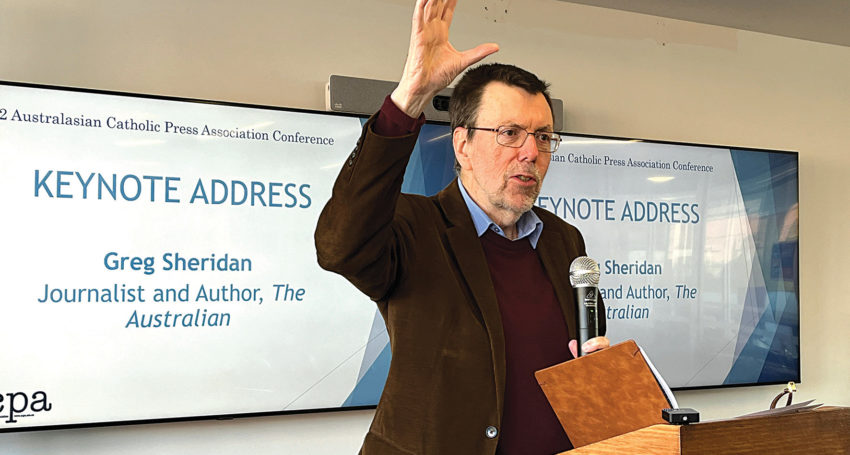
It’s not every day that you find a hard-nosed secular journalist addressing a room full of Catholic media professionals on the topic of God.
But Greg Sheridan loves a challenge and is having a lot of fun using his privileged position in the media to talk about what has become a taboo subject in modern times.
At the recent Australasian Catholic Press Association Conference in Melbourne, Greg gave a fascinating and humorous insight into his experience of writing and talking about Christianity.
Advertisement
With his “day job” involving “happy subjects” like the Chinese Communist Party, deterrent military strategy, the war between Russia and Ukraine and up until recently Donald Trump, Greg said he used to hope there’d be a United Nations mandate that would guarantee him Trump-free days.
So how did he happen to start writing books about Christianity?
“I’ve been a Catholic all my life, I’ve never had any trouble with belief, (but) I had the most enormous difficulty with living up to the most elementary standards of Christian life, so naturally I became a journalist,” he quipped.
“I’ve been in journalism for 45 years and in that time I have seen the culture change from being nominally Christian, maybe it was only ever nominal, but nominally pro-Christian when I came into the business in the late 70s.
“The Census had over 90 per cent identifying as Christian; if the Anglican or Catholic archbishop in Sydney had something to say the media reported it respectfully; TV shows had sympathetic portraits of Catholic clergymen – Catholic priests were played by Spencer Tracy in Boys Town, and Gregory Peck in The Scarlet and the Black –these were the best people you could be.
“Then I saw the culture drift into a kind of neutrality where it was neither pro or anti and now I’ve seen the culture become very, very anti-Christian…we’re not persecuted in the way that Christians in Pakistan or China or much of Africa are, but the culture is very hostile to Christianity.”
Facing this “overwhelming, unavoidable, incontestable” hostility against Christian churches, Greg said if you’re given a microphone, you have an obligation to say something about it.
“I’d always been happy to identify as a Catholic but it was more tribal and good fun,” he explained.
“I’d write the odd column, especially when John Paul II was Pope, saying ‘good on your Holiness’, and you could feel that your side was going to win the premiership that year.
“But I never really seriously engaged in religious journalism or talking about belief.
“Of course journalism is about the search for a good story and you want to search for the truth, turns out the biggest truth of all is Christianity and the best story is Christianity.
Advertisement
“It took me 40 years to discover this…however I was still very reluctant to ‘come out’ and say I believe Jesus Christ is the son of God and my savior…I believe in eternal life, salvation, these were very strange things for a secular journalist to say.”
Greg finally put his toe in the water three years ago when he wrote his memoir, then came the book God is Good for You. His publisher Allen and Unwin thought it was a “strange thing” to do but agreed to a small print run and it “sold its head off”.
“This was no great tribute to the book,” Greg said. “I had discovered a way to become the very best in your field, simply enter one in which there are no other competitors! The field of books by secular journos in favour of Christianity is quite thin.”
Greg is convinced that today’s media and culture neglects Christians and portrays them entirely negatively, citing the fact that there are “fabulous Christian books” that are never given a run on programs such as The Drum or Q&A on the ABC.
“Because I have a place in the secular media and lots of regular TV and radio segments they can’t stop me from talking about my own book,” he said, adding that The Australian was “very indulgent about what it considers to be a legitimate subject for a foreign editor to write about”.
“Coming out, so to speak, as a Christian has been nothing but fun. All Christians should own their faith publicly. Fellow Christians need the public solidarity which we don’t get now from the media generally and non-Christians need to be alerted to the truth, and have the truth of Christ’s presence announced to them in the culture.”
Greg said there was a huge response to God is Good for You and his latest book Christianity: the urgent case for Jesus in our world from not only non-believers but also Christians who hadn’t come across systematic presentations of the positive case for belief in God.
He described the culture that journalists are operating in today as becoming post-Christian, Christian and pre-Christian simultaneously.
“The first big generation of post Christian people in the West are the baby boomers (of which I am one), the most fortunate generation in history, the most mollycoddled, the most pampered – we’ve never had to go to war and we became fabulously wealthy just by owning a home,” he said.
Related Story
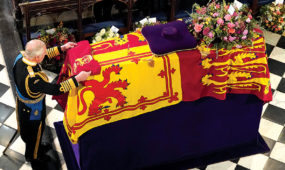 Opinion
Opinion
Glimpses of hope in the secular age
“Their Christian belief hasn’t withstood this sustained affluence, similarly it hasn’t withstood the sexual revolution of which they were part of.
“Not having been to war, they self-valourise their adolescent rebellion against their parents, and they’re still rebelling now as they head into retirement; they are a generation entombed in the 1960s, forever rebelling against their parents. They’re hostile towards Christianity but they still know something about it.
“At the same time Christians are very resilient, so Christians haven’t been eradicated from society, we’re now a minority, but a resistant minority in a hostile environment. It’s not unprecedented but it’s new in our lifetime.
“The millennials, the grand-children of the baby boomers, are not rebelling against their parents because their parents and grandparents on the whole didn’t have any faith, so they are not imbued with a historical memory of Christianity…they are in a sense a pagan culture.”
There is some hope, according to Greg, in that millennials don’t hate Christianity as the “boring practice of their parents and grandparents”, they’re simply indifferent to it. But he believes that means they can be approached and “we can sell it to them”.
As a “bold minority”, Greg insisted that minorities had rights in society and “we should demand our rights, not for ourselves but for the truth”.
“It’s a difficult environment but it’s also a fun environment; as my friends in the air force would say, it’s a target rich environment.”



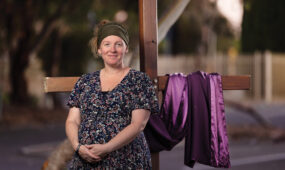
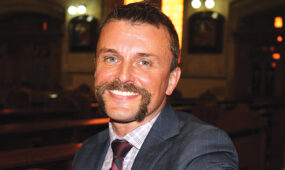
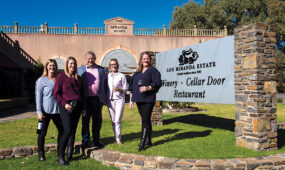
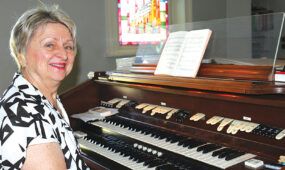

Comments
Show comments Hide comments